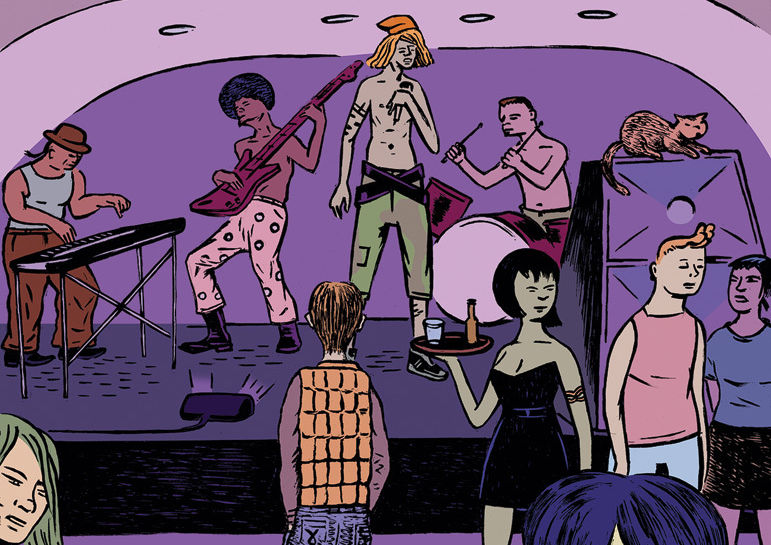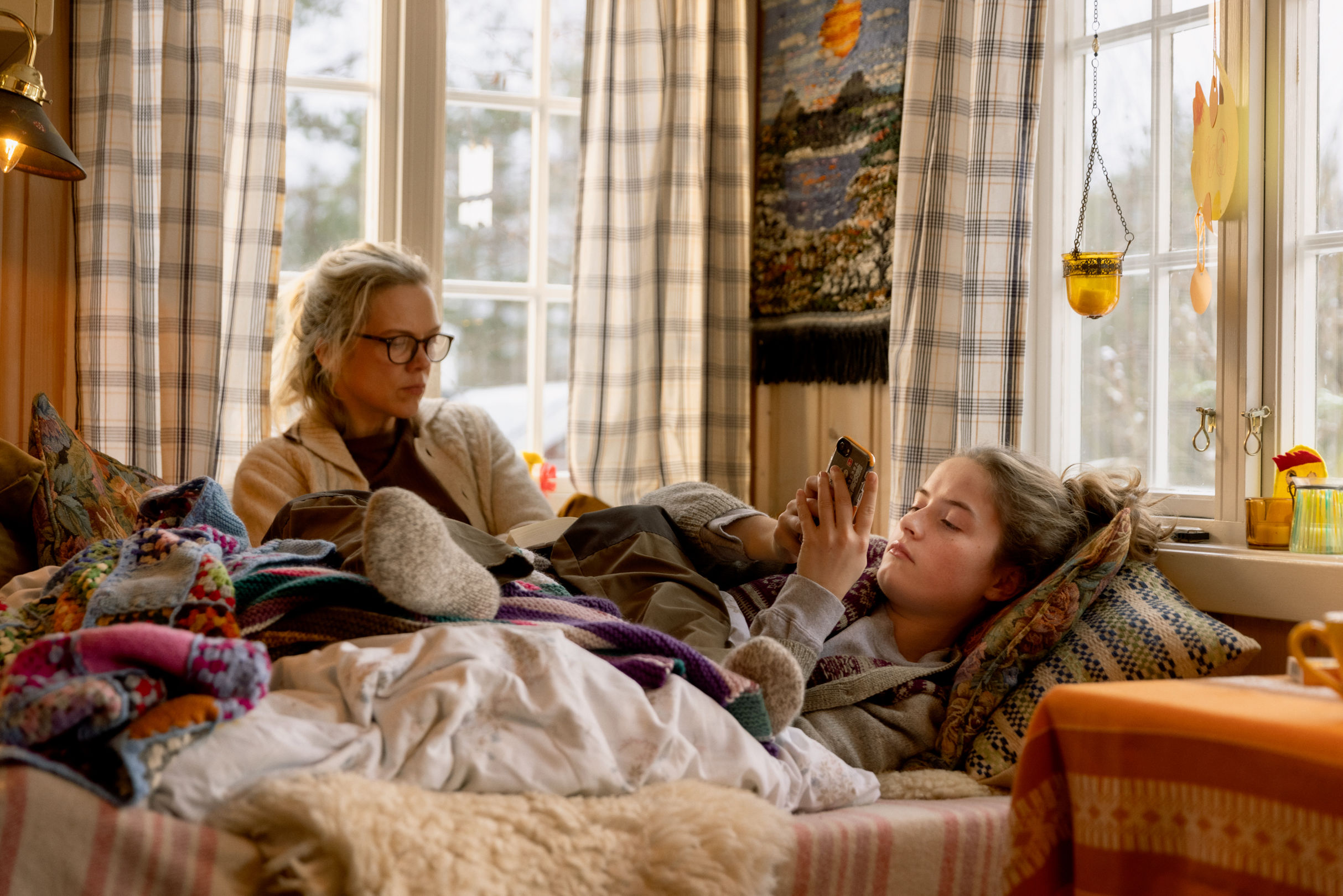The Day the Music Died

Image: Geoffrey Grahn
EVERYTHING I LEARNED about the Pacific Northwest, I learned from MTV. If not for the fact that I grew up in Arkansas, where the dearly departed oracle of underground rock 120 Minutes was one of the few cultural outlets available, I might be ashamed of that. Grunge may have ended up a fashion accessory, but it was also the aural portal through which I first romanticized this part of the country. Mount Hood and Mudhoney. Pearl Jam and Puget Sound. Let the burnouts in the Fort Smith Piggly Wiggly parking lot have their pot; my gateway drug was the gurgling feedback of indie rock thrumming into my bedroom.
Fourteen years before I officially made Portland my home, I knew I wanted to build a life among the moss and, more importantly, hitch myself to the music scene that soundtracked my awkward and formative teenage years. But it wasn’t just the music—it was the audience. When MTV broadcast videos of roiling mosh pits, crowd surfers and fans driving bands to orgasmic heights, I thought, Northwesterners must be the best music fans in the world.
Well, they may have been at one time, but I can tell you that now, they most certainly are not. If you’ve been to a concert in Portland lately, maybe you’ve noticed it too, creeping into our city like some form of cross-armed black death: complacency. You see it in the cubicle jockey bemoaning his stock portfolio—loudly—at the Doug Fir Lounge while Spoon, who typically plays for thousands, motors through an intimate set for a lucky 300 or so. You feel it as you’re forced to tiptoe around picnic blankets at McMenamins Edgefield, past "fans" who’d rather sit and sip their chardonnay than cheer Wilco’s dusk-lit entrance. And you hear it in the "Hey asshole, sit down," emanating from the overweight man sitting behind you as Crowded House—reunited after 10 years—takes the stage at the Schnitz for their only Oregon stop. What!? You want to me to sit quietly for this?
So pardon me while I duck a lightning bolt sent from Elliott Smith and ponder: Has Portland peaked as a music mecca?
From an artistic standpoint, the question is, of course, asinine. Throw a rock in the air on Hawthorne and you’ll hit some nest-haired kid with his own four-piece band. We also boast certifiable big-boy groups like the Shins, the Decemberists and Modest Mouse. Our many hometown bands are one of the reasons why AmericanStyle magazine named us one of the top 25 arts cities in the country in 2007.
Part of the problem, though, is that those patron saints of indie rock are running out of cathedrals where worshipping the music—and not the gilded environs—is the focus. Rock ‘n’ roll dives like the X-Ray Café and LaLuna—where, so I’ve heard, keeping your eyes glued to the stage was the best way to avoid spying the pool of puke in the corner—have died out, and even Satyricon (where Nirvana played its first out-of-state show) has had trouble staying in business. While Portland’s best venue, the Doug Fir, is certainly aesthetically pleasing, the fact that you can order a cosmo within 100 feet of an electric guitar is, frankly, a crime against everything rock stands for. Even a place like Edgefield, with its spectacular setting, blurs the line between performance and picnic. "It’s a beautiful venue," says the Decemberists’ lead singer Colin Meloy, "but it’s a bit like playing a concert at the zoo."
Plus, let’s face it: We’re getting old. In 2000, people in their late 20s and early 30s made up the largest age group in the city. We were one massive bar-hopping rock collective. Now the median age of Portlanders has crept to 37 years old. In human years, that’s still young. But in rock-fan years, that’s downright geriatric. Ears are marred from years of amp abuse, that old Iron Maiden T-shirt fits more like a sausage casing now, and you’re more interested in rocking out to old standbys like Duran Duran than in investing the time to find good new bands. If we even make it out past 9 p.m., we hardly have the energy to dance like nobody’s watching.
And that graying, once-fervent fan base is also being replaced by a generation of listeners who have a far different relationship to the tunes now blasting from their iPods. For decades, finding new music took effort. It meant trolling through forgotten tracks, digging through crates of old albums, discovering sacred gems with your best friend in your bedroom at 2 a.m. No more. We live in a world in which Music Millennium was forced to close its Northwest Portland location in 2007, in which discovering artists requires little more than a few clicks and a credit card number. In fact, iTunes—which sells more than 1 million tunes a day—will even make recommendations for you. If the adage that you appreciate something more the harder you work for it holds true, where does that leave today’s plugged-in easy listeners?
Apathetic, that’s where. And you can see it at live shows. In its most perfect form, says Alicia J. Rose, a local musician and booker for the Doug Fir, concerts are a communal give-and-take."The performer’s energy is often mirrored by the audience," she says. If a band rocks, we applaud. If they really bring it, we lose our minds. But audience participation has cruised to a cushy, dead-eyed plateau. This is partly because, in a town where it’s simply not hip to emote, nothing belies the intrinsic lameness corrupting your very marrow than, y’know, actually enjoying something. Or dancing when the beat moves you. Or, God forbid, flashing your devil horns.
I guess that meant a lot of folks were acting like complete tools when Arcade Fire came to town last spring. More orchestral vision quest than concert, the 10-member band incinerated the austere surroundings of the Arlene Schnitzer Concert Hall with their frenetic tent revival. The entire crowd was jumping around as though stuck inside a salty salad spinner, flinging perspiration and body parts with—could it be—unadulterated joy.
Well, all except for a music writer for the Portland Mercury. He just smirked.
For a second I felt like a ridiculous ass, dance-jogging in place like some Appalachian snake-handler. The fingers of self-consciousness began tingling up my neck. Then I heard a war whoop over my left shoulder. Some man in his 30s, who hadn’t seen an elliptical machine in years, had yanked his shirt over his shoulders and was now twirling it over his head like a white, fleshy helicopter.
At last. The man-boobed messiah I’d been looking for. Ravenous and barely sane. If I’d been summoned by this fine specimen of rock fandom to do so, I would have launched my own bare chest into the air to meet his, let our sweat commingle and explode onto the heads of those around us all Milli Vanilli-style in one ecstatic thwap-suck of joy—an homage to the real rock shows of yesteryear and the ones that should still be.




